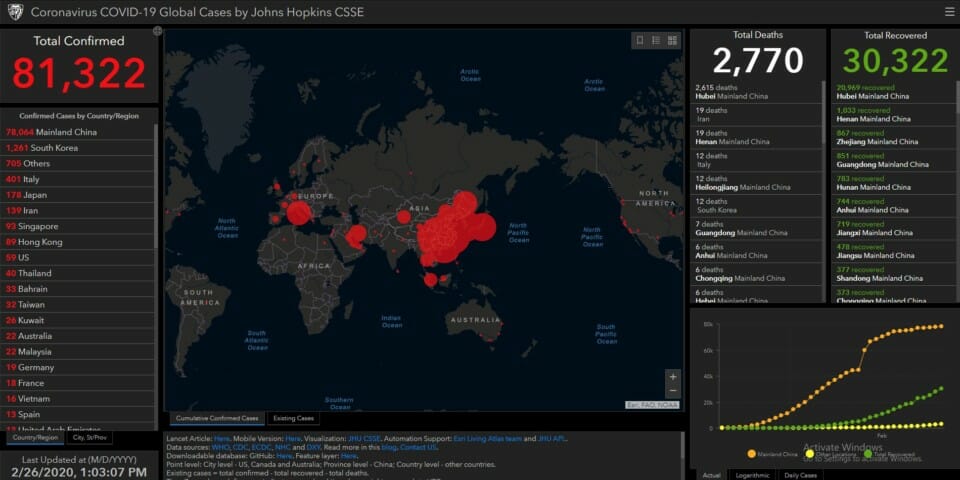Three weeks ago, I posted about a revised boarding policy with Viking River Cruises. Shelly and I are boarding a Viking Longship in Amsterdam in five weeks. We had received an email from Viking River Cruises on precautions the cruise line is taking with the outbreak of the coronavirus.
I am still getting questions from concerned passengers so I am posting a more comprehensive article on the outbreak and steps that all kinds of travelers can take to protect yourselves, not just on cruise ships. Please understand that I am not a doctor; the information that I am relying on came from the World Health Organization (WHO). In any case, you should consult with your personal physician if you have concerns about your health risks.
What Is Coronavirus?
The 2019 novel coronavirus, or 2019-nCoV, is the specific infection we are dealing with right now, while coronavirus is the name given to an entire family of viruses. For a point of reference, this is similar to SARS outbreak that started in China back in 2002, caused by another coronavirus. Infection with 2019-nCoV can cause a respiratory disease called COVID-19. (As one reader pointed out, this analogous to the disease AIDS caused by infection with HIV.)
What makes COVID-19 worrisome is that it is caused by a novel, previously unknown virus that likely jumped the species barrier from animals to humans. That means doctors and scientists don’t know a lot about how easily it infects people or how serious the symptoms will be. The flu has actually killed more people in the United States, but those infections are predictable and come every year. There’s a lot we just don’t know about COVID-19, and some people can spread the disease before they show symptoms.
Coronaviruses frequently attack the respiratory or gastrointestinal areas or both. 2019-nCoV is not an airborne virus (someone breathing nearby isn’t going to infect you). Instead it is transmitted by droplets when people sneeze or cough. Here is an informational video from WHO that explains how coronaviruses work.
Is COVID-19 Spreading?
According to this map from the Johns Hopkins CSSE, COVID-19 continues to spread. New cases in China are slowing down, but new cases are beginning to appear more frequently in other parts of the world. For example, there has been a hotbed of infections in Italy. Last Friday, Italy had three confirmed cases of coronavirus, today they have over 320. The map below was last updated on February 26, 2020.

Precautions You Can Take
WHO recommends a number of measures that you can take to help reduce the risk of getting COVID-19. In general, these are the same precautions you can take to avoid an ordinary cold or flu. Remember that many cases of COVID-19 are mild. The danger comes in three forms: First, there are many unknown details as mentioned at the beginning. Second, some cases of COVID-19 are severe, and they can progress from mild to severe quickly. Third, 2019-nCoV can apparently spread between individuals even when the infected person shows no symptoms, so it is very difficult to know where the risk exists.
(1) Wash Your Hands Frequently
Regularly and thoroughly clean your hands with an alcohol-based hand rub or wash them with soap and water. This is the number one thing you can do to prevent from getting sick. Some people wear masks, but those masks may not filter all virus-carrying droplets, or they may not be worn properly.
Why? Washing your hands with soap and water or using alcohol-based hand rub kills viruses that may be on your hands.
(2) Maintain Social Distance
Maintain at least 1 meter (3 feet) distance between yourself and anyone who is coughing or sneezing.
Why? When someone coughs or sneezes they spray small liquid droplets from their nose or mouth which may contain virus. If you are too close, you can breathe in the droplets, including the 2019-nCoV virus if the person coughing is infected.
(3) Avoid Touching Eyes, Nose, and Mouth
This is good advice in general. Your skin is a great barrier against infection, but when you touch a dirty surface and then touch your eyes, nose, or mouth you allow the infectious material to enter your body. But many people do this without thinking. The purpose of washing hands often is to prevent this accidental transfer.
Why? Hands touch many surfaces and can pick up viruses. Once contaminated, hands can transfer the virus to your eyes, nose or mouth. From there, the virus can enter your body and can make you sick.
(4) Practice Respiratory Hygiene
Make sure you, and the people around you, follow good respiratory hygiene. This means covering your mouth and nose with your bent elbow or tissue when you cough or sneeze. Dispose of the used tissue immediately.
Why? Droplets spread the virus. By following good respiratory hygiene you protect the people around you from viruses such as cold, flu and 2019-nCoV.
(5) Seek Medical Care Early If Necessary
Stay home if you feel unwell. Seek medical attention if you have a fever, cough, or difficulty breathing. Call in advance if you can rather than show up unannounced in the waiting area of your hospital emergency room or doctor’s office. Follow the directions of your local health authority.
Why? National and local authorities will have the most up to date information on the situation in your area. Calling in advance will allow your health care provider to quickly direct you to the right health facility. This will also protect you and help prevent the spread of viruses and other infections.
(6) Stay Informed and Follow Medical Advice
Stay informed on the latest developments about COVID-19. Follow the advice given by your healthcare provider, your national and local public health authority, or your employer on how to protect yourself and others from COVID-19.
Why? National and local authorities will have the most up to date information on whether COVID-19 is spreading in your area. They are best placed to advise on what people in your area should be doing to protect themselves.
Should You Cancel Your Travel Plans?
That is a personal decision. You may want to check with your travel provider to see what precautions they are using or ask your doctor if your medical history could include any cause for concern. Where you go may also be a consideration. For example, many airlines are canceling flights to China, and there have bene recent spikes in places like South Korea and northern Italy.
As for our trip on the Rhine River, we feel that we will be in a low-risk area and that Viking River Cruises is taking proactive steps to ensure the safety of its passengers. People have a lot of questions about 2019-nCoV, the novel coronavirus. The World Health Organization produced an excellent question and answer video featuring Dr. Carmen Dolea, Head of the International Health Regulations Secretariat at the World Health Organization.
https://www.youtube.com/watch?v=0KBvReECRrI
Final Thoughts
First, this post is not to alarm readers but point them in the right direction so they can get their questions about the coronavirus answered. Second, nobody should rely on a blog post when it comes to making decisions about your personal health. If you have any concerns about how traveling will affect your health, please consider checking with your personal physician. Older individuals and those with compromised immune systems are especially vulnerable.
Whether there is an outbreak of disease or not, people should practice common sense hygiene practices. These can help you avoid many types of illnesses, not just COVID-19.
Airplanes and cruise ships are confined spaces versus open spaces. Your likelihood to be in contact with a sick person is much higher in confined spaces. However, airplanes also have advanced air filtration systems. You might be more likely to get sick from touching a dirty surface like a tray table or an air vent and then touching your face. Washing your hands may be more effective than wearing a mask.
Finally, Shelly and I are full speed ahead for our Viking River Cruise. We will take the precautions recommended by the World Health Organization. I will be blogging from the cruise, and I will write about the modified boarding process and any other measures that Viking River Cruises implements along the way.

